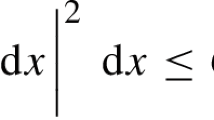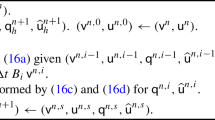Abstract
In this paper we will present the stability in L2-norm and the optimal a priori error estimate for the Runge-Kutta discontinuous Galerkin method to solve linear conservation law with inflow boundary condition. Semi-discrete version and fully-discrete version of this method are considered respectively, where time is advanced by the explicit third order total variation diminishing Runge-Kutta algorithm. To avoid the reduction of accuracy, two correction techniques are given for the intermediate boundary condition. Numerical experiments are also given to verify the above results.
Similar content being viewed by others
References
Carpenter, M.H., Gottlieb, D., Abarbanel, S., Don, W.S.: The theoretical accuracy of Runge-Kutta discretization for the initial-boundary value problem: a study of the boundary error. SIAM J. Sci. Comput. 16, 1241–1252 (1995)
Castillo, P., Cockburn, B., Schötzau, D., Schwab, C.: Optimal a priori error estimates for the hp-version of the local discontinuous Galerkin method for the convection-diffusion problems. Math. Comput. 71, 455–478 (2001)
Ciarlet, P.G.: Finite Element Method for Elliptic Problems. North–Holland, Amsterdam (1978)
Cockburn, B., Shu, C.-W.: Runge-Kutta discontinuous Galerkin methods for convection-dominated problems. J. Sci. Comput. 16, 173–261 (2001)
Cockburn, B., Karniadakis, G.E., Shu, C.-W. (eds.): Discontinuous Galerkin Methods. Theory, Computation and Applications. Lecture Notes in Computational Science and Engineering, vol. 11. Springer, Berlin (2000)
Johnson, C., Pitkäranta, J.: Convergence of a fully discrete scheme for two-dimensional neutron transport. SIAM J. Numer. Anal. 20, 951–966 (1983)
Merlet, B.: L ∞- and L 2-error estimates for a finite volume approximation of linear advection. SIAM J. Numer. Anal. 46(1), 124–150 (2007)
Reed, W.H., Hill, T.R.: Triangular mesh methods for the neutron transport equation. Los Alamos Scientific Laboratory report LA-UR-73-479, Los Alamos, NM, 1973
Shu, C.-W., Osher, S.: Efficient implementation of essentially non-oscillatory shock-capturing schemes. J. Comput. Phys. 77, 439–471 (1988)
Zhang, Q., Shu, C.-W.: Error estimates to smooth solution of Runge-Kutta discontinuous Galerkin methods for scalar conservation laws. SIAM. J. Numer. Anal. 42, 641–666 (2004)
Zhang, Q., Shu, C.-W.: Error estimates to smooth solution of Runge-Kutta discontinuous Galerkin methods for symmetrizable system of conservation laws. SIAM. J. Numer. Anal. 44, 1702–1720 (2006)
Zhang, Q., Shu, C.-W.: Stability analysis and a priori error estimates to the third order explicit Runge-Kutta discontinuous Galerkin method for scalar conservation laws. SIAM. J. Numer. Anal. doi:10.1137/090771363
Author information
Authors and Affiliations
Corresponding author
Additional information
The research of this author is supported by NSFC grant 10871093.
Rights and permissions
About this article
Cite this article
Zhang, Q. Third Order Explicit Runge-Kutta Discontinuous Galerkin Method for Linear Conservation Law with Inflow Boundary Condition. J Sci Comput 46, 294–313 (2011). https://doi.org/10.1007/s10915-010-9403-0
Received:
Revised:
Accepted:
Published:
Issue Date:
DOI: https://doi.org/10.1007/s10915-010-9403-0




